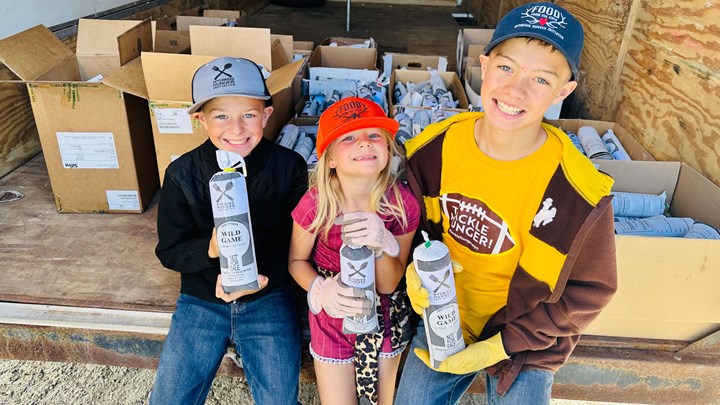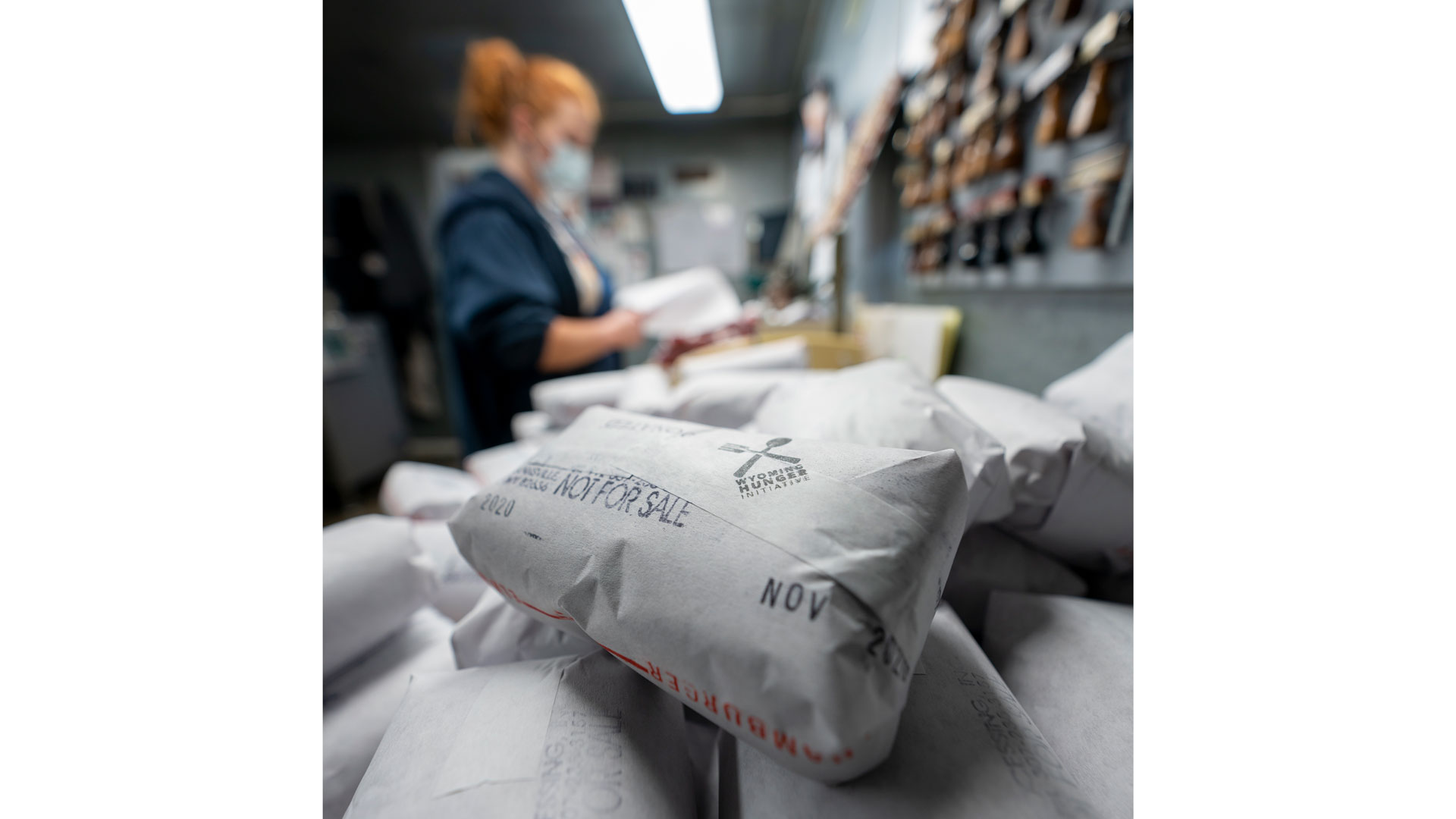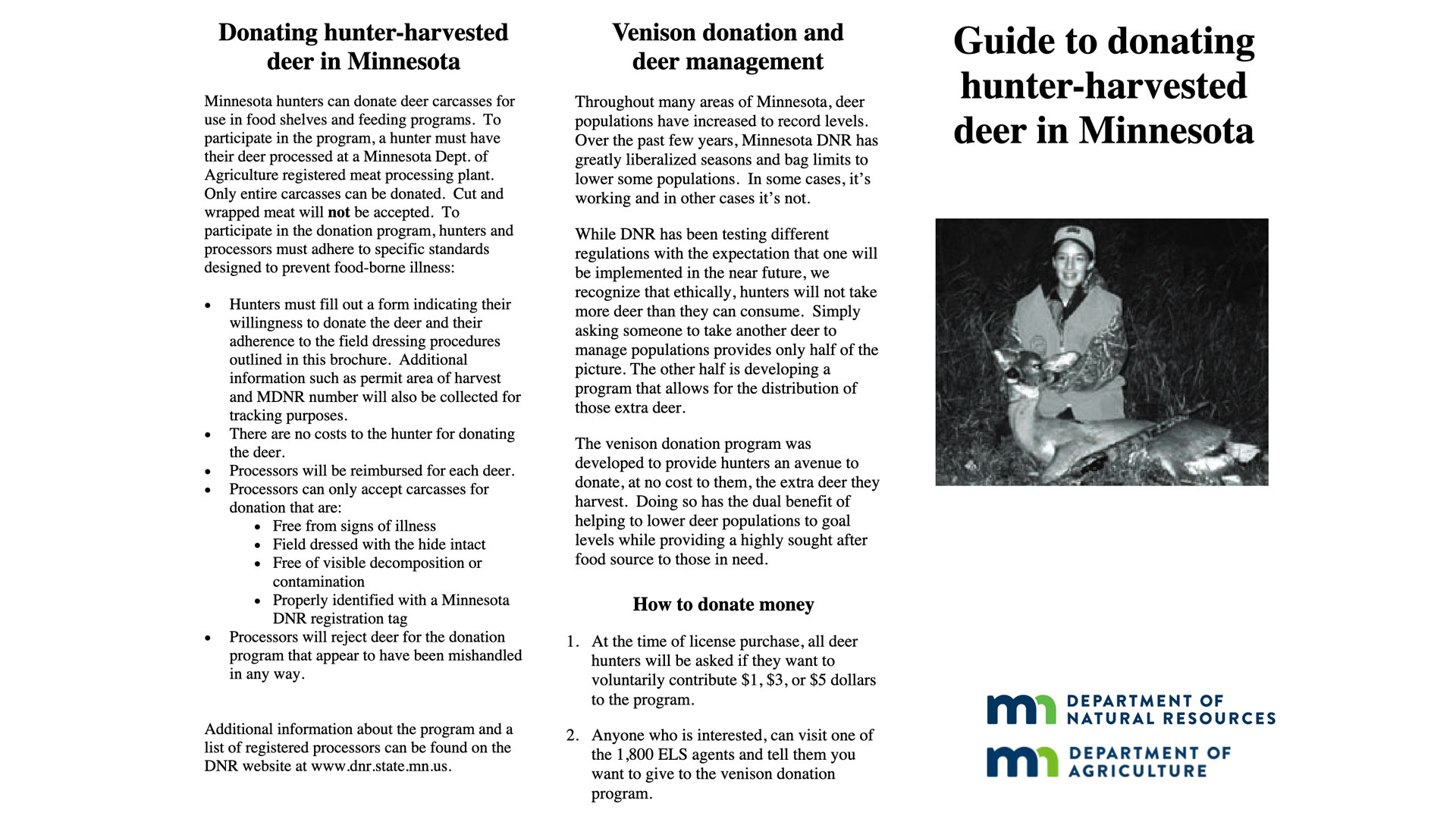
by Darron McDougal - Friday, June 2, 2023

The Wyoming Game and Fish Department (WGFD) recently released a statement highlighting that hunters have donated an impressive 20,000 pounds of game meat to people in need through Food from the Field since its inception in 2020. Perhaps you will recall outdoor writer Jim Zumbo’s article on the program that ran on this website and tracked how it was launched by Wyoming First Lady Jennie Gordon, after launching her Wyoming Hunger Initiative in 2019 to help end childhood hunger. While the 20,000-pound statistic represents a major milestone for Food from the Field, it’s also a catalyst for an important discussion regarding the role hunters play in helping to feed those less fortunate.
Most of us don’t experience hunger ourselves, or even witness it regularly, but some folks don’t know where they will get their next meal. This is why the NRA Hunters’ Leadership Forum provides funding to Hunters for the Hungry (HFH) groups nationwide. Meat donated by hunters to programs such as Wyoming’s Food from the Field, Wisconsin’s Deer Donation Program, or Maryland’s Farmers and Hunters Feeding the Hungry reaches hungry people through hunters and key collaborative partners.
For example, Food from the Field partners with WGFD, the Wyoming Department of Agriculture and participating processors to ensure that donated meat reaches food pantries statewide and hits the plates of hungry people. Similarly, Wisconsin’s Deer Donation Program harnesses an entire partner network to process and distribute donated meat.
Who Pays for the Processing?
Donating meat to beat hunger is a really great thing, but meat processors obviously can’t always donate their time to processing dozens of deer when meat processing is their livelihood. Donating is usually free to the hunter, and the processors are reimbursed. That’s because hunters are directly and indirectly funding these programs.

In Minnesota, for example, an initial $160,000 appropriation from a general fund was allocated by the legislature toward the state’s deer-donation program managed by the Minnesota Department of Natural Resources (MDNR) cooperation with the Minnesota Department of Agriculture. Non-resident license fees also increased by $5 to provide funding with an additional $1 fee increase in bonus permits to yield a projected $160,000 per year to be allocated toward the program.
Further, states such as Minnesota provide license purchasers an opportunity to voluntarily donate $1, $3 or $5 to the program before checkout. Those amounts might seem inconsequential, but if everyone chips in a dollar or five, it makes a big difference. Consider it next time you’re purchasing a license and are asked if you care to donate to a venison-donation program.
How Can I Donate Meat?
If you want to donate your next harvest, you’ll first need to identify a drop-off location. For information on locations, contact your state wildlife agency, which provides contact information on its website. It’s also important to note that there are guidelines hunters and processors must follow. These might differ just a little bit by state, but Minnesota’s guidelines, for example, will help you to understand the quality control aspect behind venison donation programs. Minnesota hunters must sign a form consenting their intention of donating meat and that they’ll follow the field-dressing requirements noted in the “Guide to Donating Hunter-Harvested Deer in Minnesota.” Processors are instructed to only accept carcasses that are properly field-dressed and with the hide intact, free from signs of illness, contamination or decomposition, and tagged with a MDNR tag. Processors are given the right to reject deer that appear to have been mishandled.

In Wisconsin, deer harvested in chronic wasting disease-affected counties must be tested for CWD either prior to or during the time of donation. WGFD also prioritizes CWD testing, as do other states.
Why Should I Donate Meat?
My wife, Becca, and I prosper on wild-game meat, which is the product of many different culinary efforts. We’ve perfected most of the dishes we prepare to the point dinner guests haven’t a clue that they’re eating venison instead of beef or wild turkey instead of chicken until we tell them. We rely 100 percent on wild game for daily nourishment. For us, the need to donate goes into effect once I procure more than enough meat for the year, which doesn’t always happen.
While Wyoming certainly isn’t in the same boat following a decimating winter, states like Illinois have regions overrun with doe deer, and landowners and lessees are thinning them out at every opportunity. I don’t know of a family who can consume a dozen or two dozen deer in a year, but some locales warrant a heavy harvest to keep numbers regulated.
In other words, hunters shouldn’t avoid harvesting simply because they’re unable to consume all of the meat. Healthy harvest is a huge factor in wildlife conservation, and there are plenty of people out there who can use the meat. So, if you’re trying to manage a booming doe population, donating is your avenue for keeping your gun smoking and the plates of hungry people full of venison.
When it comes to preparing your own nutritious wild game meals, not all hunters have the time or skill to cook delicious wild game, yet they love to hunt. In that case, I urge those hunters to either make time and get some education on preparing wild game or donate the meat to a HFH program in their community. Why choke down something you don’t like when it can be relished by someone with a legitimate need? To find a program near you, contact the NRA, which works closely with state programs to put interested individuals in touch with individuals in their area and fosters public awareness of HFH through education, fundraising and publicity. Not only does the donation provide nourishment to those who otherwise would go without but it gives you an incredible feeling of satisfaction in knowing that you bridged the gap between starvation and nourishment in someone’s life. Just imagine the positive impact your gift will make.
If you read Karen Mehall Phillips’ article, “Wyoming Women’s Foundation Delivers Hope for the Future,” hopefully you caught the bit about 17 of the 41 antelope harvested during the 2022 hunt being donated to Food from the Field. First Lady Jennie Gordon’s antelope was one of the animals donated, underscoring how she and her husband, Gov. Mark Gordon, lead by example. In the article, Mehall Phillips also wrote, “I’m proud to say that the NRA, through the NRA HLF, supports the Wyoming program and Hunters for the Hungry programs in all 50 states with an annual grant.”
Should you donate every single wild-game animal you harvest? If you rely on the meat as my wife and I do, then no. But, if you love to hunt and already have a surplus of game meat in the freezer, then donating the meat is the responsible move. And if nothing else, look for opportunities when purchasing hunting licenses to donate a few dollars to these meat-donation programs to help fund the processing.
Remember: There are folks out there who can’t make ends meet and struggle to feed themselves and their families. To that end, folks and organizations such as Wyoming First Lady Jennie Gordon and the NRA are setting good examples for the rest of us on being good stewards by blessing others. All the rest of us need to do is follow their example.
About the Author
Darron McDougal is a freelance outdoor writer and editor who lives in Antigo, Wisc., with his wife, Becca. He has hunted in 12 states and successfully taken elk, bear, hogs, turkeys, pronghorn, whitetail deer and mule deer, most with archery equipment on DIY hunts. The McDougals enjoy all things hunting and shooting. They believe in God and love to travel.
E-mail your comments/questions about this site to:
[email protected]
Proudly supported by The NRA Foundation and Friends of NRA fundraising.
